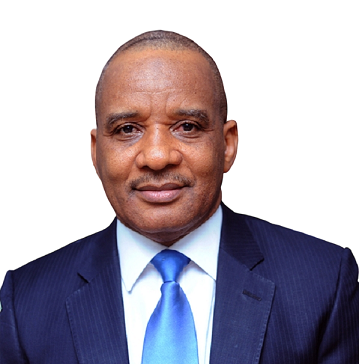Dr. Bashir Jamoh, director general and chief executive officer, the Nigerian Maritime

Administration and Safety Agency (NIMASA), was called on for duty by the Buhari-led

government in March 2020. The seasoned administrator and maritime expert has however
magnified the three years he has been in charge at the agency to apparently cover gaps and
redeem the years of his absence.

Jamoh has within the short period of his leadership of the maritime agency created so much
awareness by words and actions of the role and capabilities of the agency that he has been
rightly counted among the key legacy drivers of the Buhari’s legacy.
His approach to duty gives an overall impression of a man who knew ahead of time what he
was to do at the duty post and has gone ahead swiftly to get it done once the opportunity

called on him. He took over the leadership at NIMASA at a time that the challenge of insecurity
in the Nigerian waters and in the Gulf of Guinea headed to the climax.
The DG quickly launched a broad solution strategy built on a tripod of maritime security,
maritime safety and shipping development. The security and safety measures formed the
stepping stones to where he has planned to go – which is leading the nation to the biggest
discovery of wealth in the waters.
In two years, he has succeeded in calming the waters – that is putting the security and safety
challenges clearly behind the nation. Piracy cases in Nigerian waters have dropped from 35 in
2020 to 6 in 2021 and one in 2022. Kidnapping and piracy incidents in the Gulf of Guinea have
also experienced a similar sharp drop over the same period under a sustainable architecture for
improved maritime safety and security enforcement that is now in place.
The milestones achieved in security and safety of the waterways have rebuilt confidence within
the maritime trade community, according to Jamoh. The welcome development has ensured
seamless movement of vessels from international waters through the Gulf of Guinea and
Nigeria, he said.
This is to the extent that international maritime bodies such as International Maritime
Organisation and International Maritime Bureau have attested to Nigeria’s success in the fight
against piracy and other maritime crimes.
The gains in maritime security and safety have provided Jamoh the launching pad into the
deeper waters of the economics of maritime domain awareness with which he is ushering the
nation into the vast blue economy project of his regime.
‘The effort to secure our waters has given Nigerians more leverage to harness the enormous
resources of our maritime environment and aid the drive towards economic diversification”, he
said.
The blue economy project is ranked the first integrated maritime security strategy in West and
Central Africa to which the President committed $195 million, according to the DG. It is
supported by a model law, the first in West Africa – Suppression of Piracy and Other Maritime
Offences Act, which provides legal backing for prosecution of offenders.
The initiatives have enabled rapid response to piracy, kidnapping, oil theft, smuggling,
trafficking of persons and drugs and other crimes within Nigeria’s territorial waters and
Exclusive Economic Zone.
With the blue economy project, Jamoh is singing the same chorus of economic diversification
that constitutes Buhari’s strategy to explore new channels of resource inflow for enhanced
economic development. According to him, “today, the waters provide low hanging fruits to
diversify the economy”.
He is therefore opening up the water economy for people to launch out in a new and virtually
unlimited direction apart from oils and gas to explore what is deep there in the waters. The
move, he said, is inevitable in view of proven limitations of the oil industry in due to growing
global shift towards environmentally sustainable sources of energy.
He is leading the nation to a discovery of new jobs and careers, the emergence and growth of
coastal communities, optimization of transportation of people and goods, reduction of poverty,
renewal and sustenance of the environment – all geared towards maximizing the comparative
ocean advantages of the nation.
The vast water resources of the nation on which the blue economy project is to pivot include
853 kilometres of coastline, 8,573 kilometres of inland waterways and 28 out of the 36 states of
the federation are accessible by water and linked to five neighbouring countries’ 10,000
kilometres of navigable waterways. The nation also has 200nm of Exclusive Economic Zone,
12nm of territorial waters, six seaport complexes, 21 oil terminals and more than 10 jetties.
Besides, it has the consumer power advantage with a population in excess of 200 million.
The NIMASA boss is applying a broad based approach that cuts across states and government
ministries and agencies to extend the opportunities to harness the untapped marine potentials
of the nation to all its citizens. The blue economy drive therefore extends beyond the littoral
states where large bodies of water with jetties exist to create equally abundant opportunities in
areas that are far from the waters.
According to him, it includes development of dry ports such as the facilities in Kaduna and Kano
where cargo can be trans-shipped from seaports to the dry ports. The dry ports, he said, are
equipped to process export trade consignments and move them to the seaports.
In leading the way to opening up the water economy for a wide participation towards achieving
economic diversification, Jamoh has identified the key segments of the blue economy ready for
attracting new investments for exploitation. These include maritime transportation, fisheries
aquaculture, renewable energy and tourism.
Investment opportunities also abound in waste management, port development and logistics,
shipping, dockyards and marine tourism. Others are dredging, offshore oil and gas exploration
and production, renewable energy and maritime fabrication and construction.
He has identified fisheries as one of the key segments of great importance to Nigeria in terms of
meeting the needs of livelihood, employment, food security and generation of foreign
exchange. Other opportunities from the blue economy drive of the agency unveiled include
tourism, cargo operations, stevedoring services, warehousing/bonded term haulage,
shipbuilding and repairs.
Included also are ship/cargo surveying, ship management, tank farm, packaging, logistics and
bunkering services. Others are ship chandelling, short-sea services, ship brokerage and ship
agency, ship financing, personnel training, insurance, legal and IT services.





